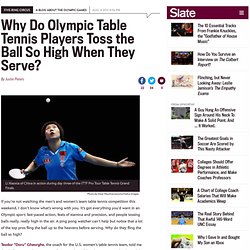

Ariel Hsing: Why do Olympic table tennis players toss the ball so high when they serve? Photo by Dean Mouhtaropoulos/Getty Images.

What if every Olympic sport was photographed like beach volleyball? Streeter Lecka/Getty Images We were browsing Getty Images last week for images of Olympic beach volleyball when we came upon something interesting.

And by “interesting,” we mean “kind of gross.” Check out these results: This got us thinking: What if all Olympic sports were photographed this way? We decided to find out. Basketball. Follow Nate Jones on Twitter at @kn8. The Male Olympian Nudity Index. Redemption for Aly Raisman. Sui Lu's inconsistencies kept her off the historic Chinese team that competed in Beijing, and she considered quitting the sport all together.

But today, Lu showed why she's the current world champion on balance beam, opening up the competition with a near flawless routine. 2004 Olympic beam champ Catalina Ponor was looking to challenge, but a big balance check in the middle would take her out of the running for gold. Gymnastics Wrap-up: What We Learned From the London Games. McKayla Maroney competes on the vault in the women's team final.

The artistic gymnastics events at the 2012 Olympics are all complete, and this year's Games taught us a number of lessons. Here, now, a breakdown of what we learned about the state of the sport from the London Games. Life isn’t fair, and neither are the Olympics.
Jordyn Wieber cried. What a baby. Photo by Timothy A.

Clary/AFP/Getty Images. Badminton scandal, Olympics 2012: Why were those Olympic badminton players trying to lose? And why is the sport so dirty? Photograph by Michael Regan/Getty Images.

Eight female badminton players from China, South Korea, and Indonesia have been disqualified from the London Olympics over charges that they tanked a pair of doubles matches. Why were they trying to lose on purpose in the first place? It’s basically all Denmark’s fault—but we’ll get to that in a second. First, a word on the badminton tournament structure. Like many Olympic sports, badminton has a preliminary round that’s used to determine seeding and a knockout round that decides who wins gold, silver, or bronze. Given that just 16 teams entered the women’s doubles tournament and half qualify for the knockout stage, it was possible for teams to clinch a spot in the medal round with one preliminary game remaining. London Olympics 2012: Why new gymnastics scoring guidelines are an improvement. Photo by BEN STANSALL/AFP/GettyImages The 2012 Olympic Games in London will use a relatively newfangled system for scoring gymnastic routines.
The revamped rules, which debuted in Beijing in 2008, make an athlete’s artistry less important than her ability to string together loads of technically difficult moves. Today’s system has also eliminated what used to be the pinnacle of gymnastics achievement: the perfect 10. Four years ago, Jordan Ellenberg argued that the new scoring was more in line with the Olympic spirit of “faster, higher, stronger,” and he advised lovers of the perfect 10 to get over it. His original piece is printed below. How China trains its children to win gold - standing on a girl's legs as young boys hang from bars. Nanning Gymnasium in Nanning, China, is one of many ruthless training camps in ChinaHere children, some as young as five, battle to complete the demanding routines on bars, rings, and mats By Matt Blake Published: 15:44 BST, 1 August 2012 | Updated: 17:41 BST, 1 August 2012 Her face etched with pain, a child trains for Olympic glory while her gymnastics trainer stands on her legs.

The cartoon space rockets and animal astronauts on her tiny red leotard are a stark and powerful reminder of this little girl's tender age as she trains as hard as any adult athlete in the Western world. Nanning Gymnasium in Nanning, China, is one of many ruthless training camps across the country to which parents send their children to learn how to be champions. Hard training: Her face etched with pain, a child trains for Olympic glory while her gymnastics trainer stands on her legs. Only last January harrowing photographs were posted on the internet showing Chinese children crying in pain as they were put to work.
US volleyball's Smith competes with hearing loss. LONDON (AP) — At UC Irvine, coach John Speraw had the "David Smith Rule" for his star middle blocker.

"That means, 'When David wants it, David takes it,'" Speraw said. "Because in the middle of a play, you can't call him off. " The reason? Smith is nearly deaf and primarily uses lip reading to understand his teammates. In volleyball, such face-to-face communication is not always possible. Hence the David Smith rule. Oscar Pistorius Olympics 2012: Do the Blade Runner’s artificial legs give him an unfair advantage? Photo by Alexander Hassenstein/Getty Images.

South Africa’s bilateral amputee sprinter Oscar Pistorius finished second in his heat in the 400 meters earlier today, advancing to tomorrow’s semifinals with the first round’s 16th-best time. The 25-year-old Pistorius, who ran a time of 45.44 in the first round, will likely have to improve on his personal best of 45.07 to make the final. Even if he doesn’t get through, he’ll run again this coming week as part of South Africa’s 4-by-400-meter relay team. And Pistorius, who won gold in the 100, 200, and 400 at the 2008 Paralympics, will also compete at the 2012 Paralympic Games, which begin later this month in London. China's Olympics training program: Abusive. Ariel Hsing: Why do Olympic table tennis players toss the ball so high when they serve?